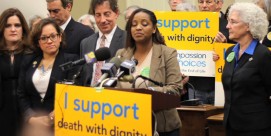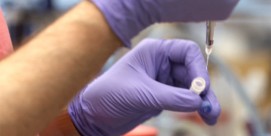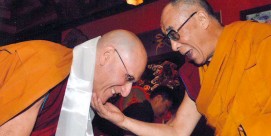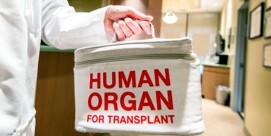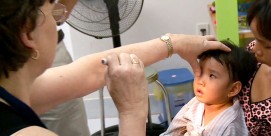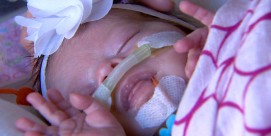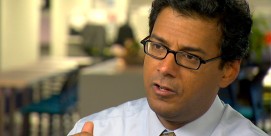Topic: Health and Medicine
“People in this generation have had a lot of control over their own lives. They’ve had a lot of choices that they were able to make, living in relatively good financial circumstances, for example, and maybe they want choices to have at the end. They want to control how they go out,” says University of Maryland philosophy professor Sam Kerstein. More
A promising new medical technique known as gene editing—deleting, inserting, or replacing genes in human cells—has the potential to cure many genetic diseases. But ethicist Marcy Darnovsky of the Center for Genetics and Society is concerned about the safety of the technology, the ethical questions it raises, the unintended consequences that may be passed on to future generations, and the possibility of wealthy parents genetically enhancing their children regardless of medical necessity. More
“You can only be tough so much,” admits Buffalo Bills icon Jim Kelly. Together he and his wife Jill and their daughters have confronted the death of a terminally ill son and Jim’s struggles with cancer. But “those things we go through that cause us to be tested, or to doubt, or to fear—those things make us stronger in our faith,” says Jill Kelly. More
Buddhism became a sanctuary for Dr. Barry Kerzin and led to his ordination as a monk. Now he serves as the Dalai Lama’s personal physician and combines his medical wisdom with love and compassion that translate into empathy. More
“What are the ethics and morals of Jews giving kidneys to anybody, as long as that recipient is Jewish?” asks writer Paul Berger, who works for the national Jewish newspaper Forward. More
“This is very, very different than being the great white surgeon who comes in and does some magical surgeries and then leaves without imparting any of the magic to the surgeons in the community. It’s teaching the doctors the surgical skills to go forth and do good things for the community, and also teach other doctors,” says Dr. Mary O’Hara, one of the volunteer surgeons traveling with the Orbis flying hospital to treat eye conditions and train local doctors on a recent trip to Vietnam. More
Modern medicine now allows premature infants to survive, but at what cost? “The big question today,” observes Dr. John Lantos, a pediatric bioethicist at Children’s Mercy Hospital in Kansas City, Missouri, is how many survive without devastating neurologic impairments or other chronic medical problems?” More
“This is a joy that stands up and says, ‘Even in the midst of darkness and loss, I will still fight back and rejoice,'” says the evangelical author of “Fight Back with Joy,” a memoir of her journey from grief to joy despite breast cancer. More
“An illness is a story for people. It’s a chapter in their life. It may be, in some cases, the last chapter in their life. Your chance to be the author of what happens in your story is fundamental to the meaning of people’s lives. That story of what happens is how we think, it’s how we breathe, it’s how we live our whole life.” More
“There’s really no widespread religious objection to the [measles] vaccine…It’s that I have a belief that these vaccines are harmful, or that they don’t work, or I don’t believe that somebody else should be telling me how to raise my kids,” says Religion News Service editor-in-chief Kevin Eckstrom. More

